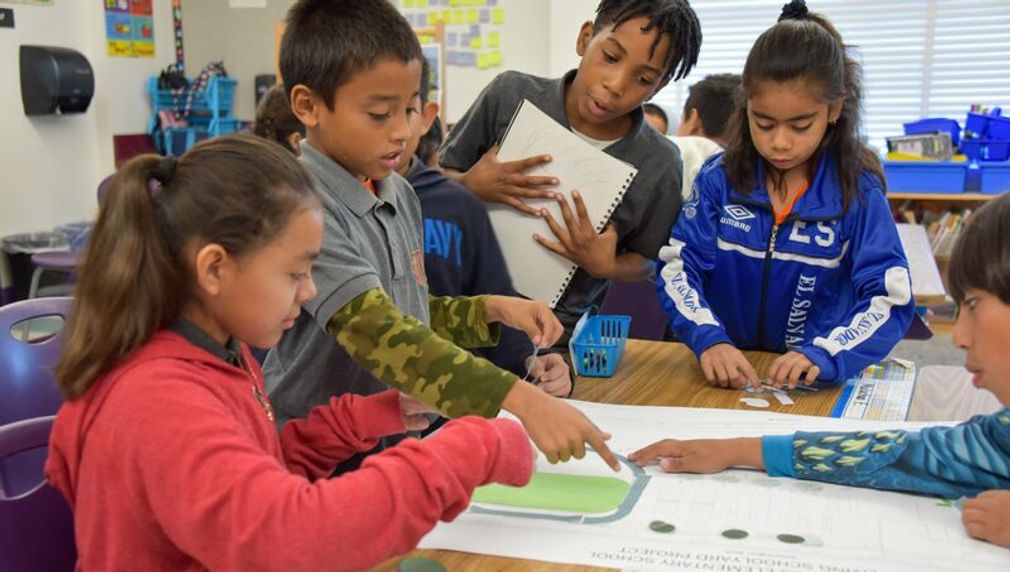Boyle Heights Schoolyard Greening
Promesa Boyle Heights (Promesa) is a "collective of residents, youth, schools, and community organizations united in lifting community voices and working together to transform conditions and improve opportunities for students and families." Promesa, in partnership with Trust for Public Land, is leading community engagement to reimagine four LAUSD schools in the Boyle Heights neighborhood of Los Angeles as green schoolyards. These transformations will improve students' educational and health outcomes and increase vital access to greenspace.

What is the primary issue area that your application will impact?
Green Space, Park Access, and Trees
In which areas of Los Angeles will you be directly working?
East LA
Other:: Boyle Heights
In what stage of innovation is this project, program, or initiative?
Expand existing project, program, or initiative
What is your understanding of the issue that you are seeking to address?
Boyle Heights is a predominantly Latinx neighborhood of generational immigrant families and new immigrants. More than 85,000 residents reside in 6.5 square miles. Spanish is a primary language. It is in the top 10% of income and educational risk factors across LA County. 30% of families live below the federal poverty line, double the county rate, and over 90% of students qualify for free or reduced-price lunch. Median household income is $34,136. Over half of adults lack a high school diploma, Unemployment is 14%. Challenges are compounded by the environmental justice burden caused by the lack of parks and greenspace. There are 0.39 parks per 1,000 residents. Proximity to freeways, and industrial spaces places the community in the state's 90th percentile for pollution burden and exposure to particulates, and 80th percentile for drinking water contamination and lead exposure. Residents face significantly higher levels of asthma, cardiovascular disease, and exposure to extreme heat.
Describe the project, program, or initiative this grant will support to address the issue.
Promesa and TPL are partnering on 4 schoolyard transformations in Boyle Heights at Sheridan Street Elementary, Hollenbeck Middle School, First Street Elementary, and Utah Street Elementary. These transformations will serve students, faculty and staff in a dense urban environment with legacy environmental justice issues by removing asphalt and hardscape and using natural elements that provide social and ecological benefits. To ensure the new green schoolyards meet the needs of the community, Promesa will design and implement a community engagement process at each school. We will host regular parent center meetings and provide support in convening school and community stakeholders for an array of events where invitations for the deeper level inputs for the project design can take place. TPL will work with us and the schools to refine and implement its successful school engagement model to engage students to redesign their campuses. This builds agency by guiding students to determine the look and feel of their schoolyard. Students will learn about native plants and the water cycle; observe and analyze heat, shade, and drainage on the schoolyard; and participate in field trips to visit local parks for inspiration. They will sketch ideas, poll the broader school community, and vote on amenities, making the process fun and educational. TPL will then refine the design and present it back to the schoolyard design committee and broader school community for implementation.
Describe how Los Angeles County will be different if your work is successful.
Near term, the project will create 4 schoolyard designs that incorporate community input and will guide the transformation of green schoolyards with natural elements, and spaces for play, learning, and rest supporting 2,746 students. Longer term, the school transformations will benefit an under-resourced, densely populated, park-deficient neighborhood of 85,000 residents, serving as a model for schoolyard transformations across the county. Greening will provide vital park access, support healthy learning environments, and combat heat islands. It will encourage learning, play and provide a respite from the dense, hardscape surroundings. Trees will shade and lower air temperatures. Increased shading also lowers energy use and associated GHG emissions and absorbs air pollutants, contributing to improved local air quality. Increased tree canopy, permeable surfaces, and high efficiency irrigation will reduce flooding and stormwater runoff.
What evidence do you have that this project, program, or initiative is or will be successful, and how will you define and measure success?
This community-centered schoolyard greening approach has been used successfully by TPL, at Castellanos Elementary in the Pico- Union neighborhood, at multiple schools in Oakland, and nearly 300 schoolyards around the country. These spaces are designed in collaboration with school districts, educators, parents, children, and community members to ensure their needs are centered. Work at these sites has improved community environmental resilience, access to green space, and opportunities for learning and play. TPL measures project success based on improvements in park equity and access, specifically, the number and demographics of people residing within a 10-minute walk of their projects. Their multi-method evaluation process relies on the collection of quantitative and qualitative data collected from GIS tools, direct observation, tracking, surveying, and design calculations. Data is collected before and after each park is built to help the team fully understand the many benefits.
Approximately how many people will be impacted by this project, program, or initiative?
Direct Impact: 2,746
Indirect Impact: 85,000
Describe the role of collaborating organizations on this project.
Trust for Public Land (TPL) will manage the project, and will initiate and manage construction. Promesa will lead the community engagement process and coordinate with TPL to ensure input is accurately reflected in the design. TPL's project managers are effective at managing consultant teams with community outreach partners. During the design phase, TPL will establish clear deadlines for deliverables, such as 100% construction documents. TPL will then hire the contractor, oversee planting and construction, and work to develop a stewardship plan for each site.